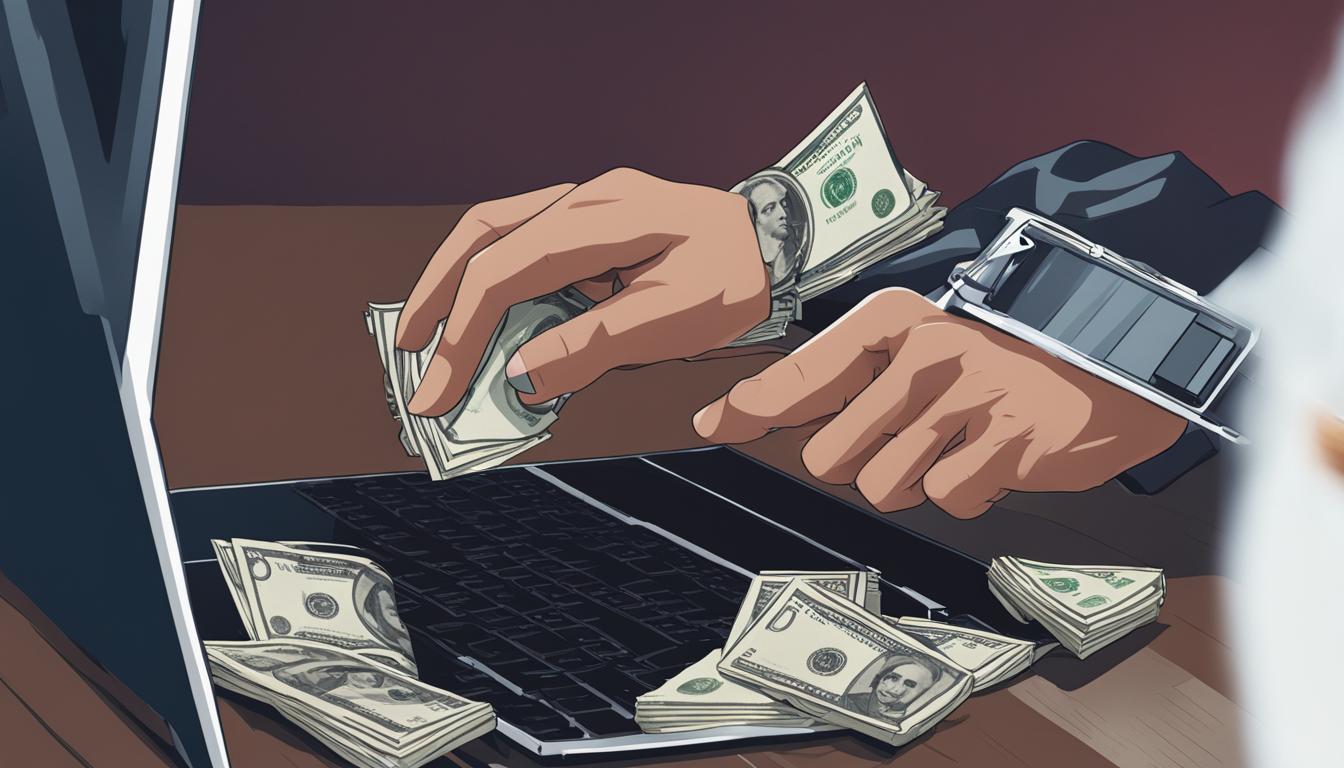Scams targeting individuals who have already lost money are unfortunately common, and victims may be approached by refund or recovery scammers promising to help them recover their losses. However, these scammers often require upfront payment and end up scamming the victims even further. It is important to understand how refund and recovery scams work, recognize the signs, and know how to avoid them to protect yourself from further financial harm.
Key Takeaways
- Refund and recovery scams prey on individuals who have already been scammed, promising to help them recover their losses.
- These scammers often require upfront payment, leading to further financial harm.
- Recognizing the signs of refund and recovery scams is crucial for protecting yourself.
- Avoid paying any upfront fees and be skeptical of unsolicited contacts.
- If you have already paid a scammer, report the scam, contact your bank, and consider seeking legal advice.
How Refund and Recovery Scams Work
Refund and recovery scams are a common ploy used by scammers to exploit individuals who have already been scammed. These scams follow a predictable pattern, targeting victims who are desperate to recoup their losses. By understanding how these scams operate, you can protect yourself from becoming a victim and avoid further financial harm.
After falling victim to an initial scam, scammers will reach out to you, claiming to be able to help you recover your stolen money or regain the promised prize or merchandise. They may use information about your previous scam experience to gain your trust and appear legitimate. To make their scheme more convincing, they may impersonate a government agency, consumer advocacy group, or even the fraudulent company that took your money.
“We have identified the scammers who took your money. I represent a government agency that specializes in refunding victims of scams. I assure you that we can recover your funds, but we need your cooperation. Please provide us with your personal and financial information, as well as a small upfront fee to cover administrative costs.”
As the scam progresses, the scammers will typically request upfront fees or sensitive personal and financial information from you. They claim that these details are necessary to facilitate the refund or recovery process. However, providing them with this information only leads to further loss, potential identity theft, and no chance of recovering your money.
It’s important to remember that legitimate organizations, such as government agencies or reputable consumer advocacy groups, will never ask for upfront payments or personal and financial information to assist with a refund. Being aware of the tactics used by refund and recovery scammers can help you recognize these scams and protect yourself from falling victim.
To summarize, refund and recovery scams work by preying on the desperation of scam victims. Scammers use various methods to gain your trust, impersonate authoritative entities, and exploit your willingness to recover your losses. By understanding the workings of these scams, you can be better equipped to recognize and avoid them, protecting yourself from further financial harm.
How to Recognize Refund and Recovery Scams
Being able to recognize refund and recovery scams is crucial in protecting yourself from becoming a victim. There are several warning signs that can help you identify these fraudulent schemes:
- Upfront Fees: One red flag is being asked to pay an upfront fee by someone claiming to help you recover your money. Legitimate government agencies or organizations will never ask for payment to assist with a refund.
- Impersonation: Scammers may pretend to be from reputable organizations, such as government agencies, banks, or consumer protection groups. They may use official-sounding names or logos to deceive victims.
- High-Pressure Tactics: Scammers often use high-pressure tactics to create a sense of urgency. They may claim that you must act immediately to secure your refund or recovery.
- Unsolicited Contacts: Be skeptical of unsolicited contacts, whether through phone calls, emails, or social media messages. Legitimate refund or recovery services generally do not reach out to victims without their prior request.
- Too Good to be True: If an offer sounds too good to be true, it probably is. Scammers may promise incredible results or guarantee full refunds without proper documentation or investigation.
It’s important to stay vigilant and trust your instincts. If something feels off or suspicious, it’s better to err on the side of caution and seek legitimate assistance or advice.
Steps to Take:
If you suspect that you are being targeted by a refund or recovery scam, here are some steps you can take to protect yourself:
- Hang Up or Delete: Disconnect the call or delete suspicious emails and texts. Do not engage further with the scammer.
- Research and Verify: Research the organization or individual contacting you. Verify their legitimacy through official websites or phone directories.
- Contact Legitimate Sources: If you believe the offer is genuine, contact the organization directly using their official contact details to verify the claim.
- Guard Personal Information: Never provide personal or financial information to unknown individuals or organizations.
- Report the scam: File a complaint with the Federal Trade Commission (FTC) and your local consumer protection agency to help prevent others from falling victim to the same scam.
Remember, protecting yourself from refund and recovery scams starts with education and awareness. Stay informed, be cautious, and report any suspicious activity.
How to Avoid Refund and Recovery Scams
To avoid scams related to refunds and recovery, it is important to be vigilant and cautious. Here are some essential steps you can take:
- Never trust unsolicited contacts: Be wary of calls, letters, emails, or messages from individuals claiming they can recover your money for a fee. Legitimate organizations will not make such requests.
- Avoid upfront payments: Legitimate entities will not ask for upfront payments or personal and financial information to initiate the refund or recovery process.
- Exercise caution with payment methods: Be wary of payment methods that are difficult to trace, such as cash, gift cards, cryptocurrency, and wire transfers. These methods are often favored by scammers.
- Conduct thorough research: Before providing any information or payment, research the organizations or government agencies contacting you. Verify their legitimacy through reliable sources to ensure you are not dealing with scammers.
Stay alert and protect yourself from refund scams, recovery scams, and other fraudulent activities by following these guidelines. Taking preventive measures is crucial to keeping your finances safe.
How to Get a Refund If You Already Paid a Scammer
If you have already fallen victim to a scam and paid a scammer, don’t lose hope. There are steps you can take to try and get a refund for your losses. Acting quickly and following the right course of action can increase your chances of recovering your money.
- Report the scam: Start by reporting the scam to the Federal Trade Commission (FTC) and your state attorney general. This helps authorities track and investigate scams, and it may provide valuable information that can aid in your recovery process.
- Contact your bank/payment provider: Reach out to your bank or payment provider immediately and explain the situation. Inform them that you have been scammed and request a chargeback or reversal of the transaction. They may be able to assist you in recovering the funds.
- Provide evidence: Gather any evidence you have related to the scam, such as receipts, emails, or any communication you had with the scammer. These documents can support your claim and strengthen your case for a refund.
- Monitor your accounts: Keep a close eye on your bank accounts and credit card statements for any suspicious activity. Scammers may attempt to make further unauthorized charges, so it’s essential to detect any fraudulent transactions as soon as possible.
- Consider legal advice: If necessary, you may want to consult with a legal professional who specializes in fraud or consumer protection. They can provide guidance on your specific situation and help you explore any legal avenues to recover your money.
Remember, the key to getting a refund is taking swift action and providing all relevant information to the right authorities and institutions. While the process may not always be straightforward, persistence and diligence can increase your chances of getting your hard-earned money back.
| Steps to Get a Refund: | Action |
|---|---|
| 1 | Report the scam to the FTC and state attorney general |
| 2 | Contact your bank/payment provider for a chargeback/reversal |
| 3 | Provide evidence of the scam |
| 4 | Monitor your accounts for suspicious activity |
| 5 | Seek legal advice if needed |

“Acting swiftly and providing evidence are crucial when seeking a refund for a scam payment. Remember, persistence and seeking professional help can greatly improve your chances of success.”
Can You Get Money Back From Your Bank If You Get Scammed?
If you have been scammed and lost money, you may wonder if your bank will refund the scammed money. The answer to this question depends on various factors, including your bank’s policies, the type of scam, how you paid, and how quickly you reported the fraud. Certain consumer protection laws and regulations, such as the Fair Credit Billing Act (FCBA) and zero liability protection policies offered by credit card companies and some banks, provide some level of protection for fraud victims.
When it comes to getting money back from your bank after being scammed, it’s essential to understand the specific guidelines and protection measures in place. While each bank may have its own policies, here are a few key points to consider:
- Bank’s policies: Different banks have different policies regarding fraud and scams. Some banks may offer a refund or reimbursement for scammed money, while others may have more limited options. It’s important to review your bank’s policies and contact their customer service or fraud department for guidance.
- Type of scam: The type of scam you fell victim to may impact your chances of getting money back from your bank. Some scams, such as unauthorized charges or identity theft, may be more likely to be eligible for reimbursement compared to other types of scams.
- Payment method: The payment method you used for the transaction can also play a role in the bank’s decision to refund your money. Credit cards typically offer stronger fraud protection compared to debit cards or bank transfers, as they often come with zero liability policies that protect consumers from unauthorized charges.
- Reporting the fraud: Promptly reporting the fraud to your bank is crucial. Banks may have specific timeframes within which you need to report the scam to be eligible for reimbursement. Contact your bank as soon as you detect fraudulent activity on your account.
While there is no guarantee of getting all the scammed money back from your bank, understanding the available options and taking immediate action can increase your chances of financial recovery. It is essential to familiarize yourself with your bank’s policies, closely monitor your accounts for any suspicious activity, and promptly report any fraud or scams to your bank.
Your First Step: Secure Your Identity and Report the Fraud
If you have been scammed, it is crucial to take immediate action to protect yourself and prevent further harm. Securing your identity and reporting the fraud are essential steps in this process.
To start, document all the details of the fraud, including any communication or transactions with the scammer. This information will be valuable when reporting the incident and seeking assistance.
It is important to cease all contact with the scammer. Do not engage in any further communication or provide them with any additional personal or financial information.
Next, contact your bank or credit card issuers to lock your cards and cancel any affected accounts. This will help prevent any unauthorized access or further fraudulent charges.
Additionally, check if your insurance policy or employer offers coverage for fraud or identity theft. Understanding your options for financial recovery can provide some peace of mind.
To further protect yourself, freeze your credit with the major credit reporting agencies. This will add an extra layer of security and prevent unauthorized individuals from accessing your credit information.
Reporting the fraud is crucial in assisting law enforcement agencies and preventing others from falling victim to the same scam. File an official report with the Federal Trade Commission (FTC) at their website or through their helpline.
As an additional security measure, update your passwords for all your online accounts and enable two-factor authentication whenever possible. This will help safeguard your personal information and prevent unauthorized access.
Remember:
Securing your identity and reporting the fraud are critical first steps after being scammed. By taking immediate action, you can protect yourself from further harm and contribute to the prevention of scams.

How to Recover Scammed Money From Your Bank
Recovering scammed money from your bank may be possible in certain situations. If you discover an unrecognized charge on your bank account, it is important to take immediate action. Contact your bank’s fraud department and provide them with the details of the unauthorized transaction. By reporting the incident promptly, you can increase your chances of recovering the scammed funds.
One option to consider is requesting a chargeback under relevant consumer protection regulations. For example, the Fair Credit Billing Act (FCBA) and the Electronic Fund Transfers Act (EFTA) offer provisions for disputing unauthorized charges. By initiating a chargeback, you can potentially recover the scammed money.
If scammers have used your credit or debit card, it is crucial to report the fraudulent charges to your card issuer. They will guide you through their dispute process and assist in investigating the fraud. Remember to provide detailed information and any evidence you have regarding the scam.
It is essential to keep a close eye on your bank statements and monitor your accounts regularly. Report any new instances of fraud promptly to your bank and follow their procedures for resolution. By staying vigilant and proactive, you can protect your finances and increase the chances of recovering your scammed funds.
“Recovering scammed funds requires swift action and cooperation with your bank. By promptly reporting unauthorized charges and following the appropriate procedures, you can increase the likelihood of regaining your money.” – Financial Fraud Expert
Conclusion
Financial reimbursement after a scam can be a complex process, but understanding your options and taking prompt action is crucial. Scams can leave victims in a vulnerable financial position, which is why it is important to recognize and avoid them whenever possible. If you have been scammed, securing your identity and reporting the fraud immediately significantly increases your chances of recovering the stolen money.
Remember to file a complaint with the relevant authorities and provide as much documentation as possible to support your case. While not all methods of payment can be reversed, there are potential avenues for recovery. By raising awareness about these scams, we can help protect others from falling victim to similar fraudulent activities.
It is essential to remain vigilant and skeptical of unsolicited offers or requests for payment. Legitimate organizations will never ask for upfront fees, and government agencies will not charge for refund assistance. As you navigate the aftermath of a scam, consider seeking legal advice and consulting with your bank or payment provider to explore potential options for financial reimbursement.
FAQ
How do refund and recovery scams work?
After being scammed, scammers may contact you claiming they can get your money back or recover the promised prize or merchandise. They often use information about your previous scam experience to sound believable and gain your trust. They may pretend to be from a government agency, consumer advocacy group, or the scammy company that took your money. Eventually, they will ask you to pay upfront fees or provide personal and financial information, leading to further loss and potential identity theft.
How can I recognize refund and recovery scams?
One red flag is being asked to pay an upfront fee by someone claiming to help you recover your money. Legitimate government agencies or organizations will never ask for payment to assist with a refund. Additionally, scammers may pretend to be from reputable organizations or use high-pressure tactics to convince you that they can help. Always be skeptical of unsolicited contacts and claims that sound too good to be true.
How can I avoid refund and recovery scams?
To avoid refund and recovery scams, never trust calls, letters, emails, or messages from someone claiming they can recover your money for a fee. Legitimate organizations will not ask for upfront payments or personal and financial information. Be cautious of payment methods that are difficult to trace, such as cash, gift cards, cryptocurrency, and wire transfers. Research any organizations or government agencies that contact you and verify their legitimacy before providing any information or payment.
How can I get a refund if I have already paid a scammer?
If you have already paid a scammer, act quickly and report the scam to the Federal Trade Commission (FTC) and your state attorney general. Contact your bank or payment provider to explain the situation and request a chargeback or reversal of the transaction. Provide any evidence you have, such as receipts or communication with the scammer. Keep monitoring your accounts for any suspicious activity and consider seeking legal advice if necessary.
Can I get money back from my bank if I get scammed?
The answer to this question depends on various factors, including your bank’s policies, the type of scam, how you paid, and how quickly you reported the fraud. Certain consumer protection laws and regulations, such as the Fair Credit Billing Act (FCBA) and zero liability protection policies offered by credit card companies and some banks, provide some level of protection for fraud victims.
What should be my first step if I’ve been scammed?
If you have been scammed, it is crucial to secure your identity and report the fraud immediately. Document the fraud and cease all contact with the scammer. Contact your bank or credit card issuers to lock your cards and cancel any affected accounts. Check if your insurance or employer provides coverage for fraud or identity theft. Freeze your credit with the major credit reporting agencies to prevent unauthorized access. File an official report with the FTC and update your passwords and enable two-factor authentication for added security.
How can I recover scammed money from my bank?
Recovering scammed money from your bank may be possible in certain situations. If there is an unrecognized charge on your bank account, contact your bank’s fraud department and provide details of the unauthorized transaction. Request a chargeback under relevant consumer protection regulations like the Fair Credit Billing Act (FCBA) or the Electronic Fund Transfers Act (EFTA). If scammers used your credit or debit card, report the fraudulent charges to your card issuer and follow their dispute process. It is important to monitor your statements and report any new fraud charges promptly.





